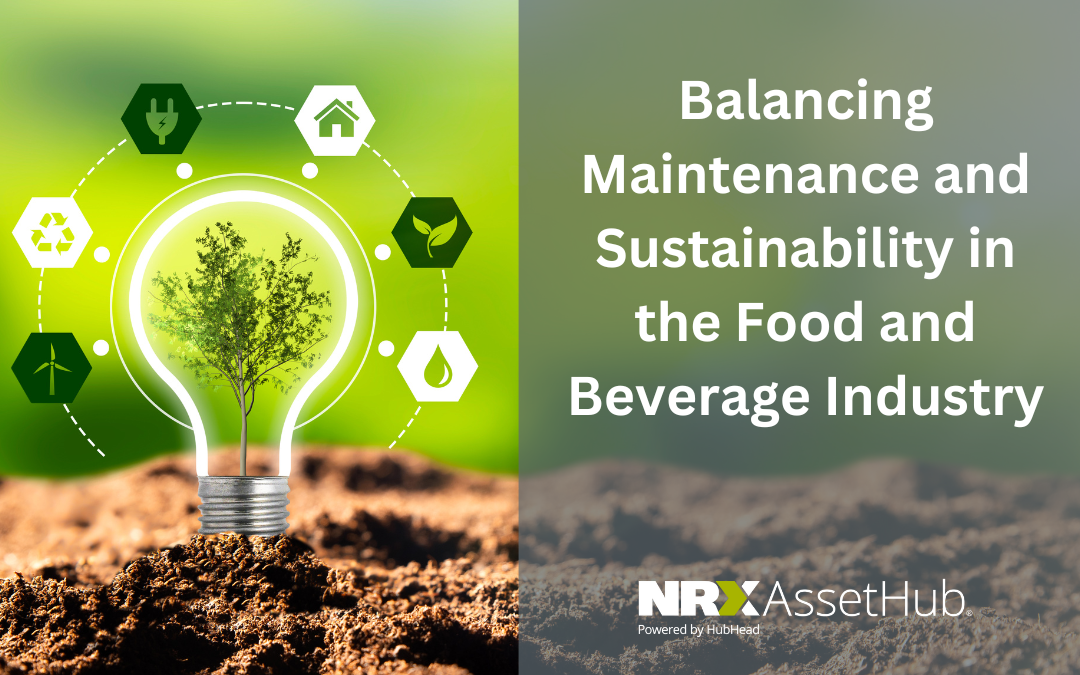The food and beverage industry plays a crucial role in providing sustenance to people worldwide. However, this sector also faces increasing pressure to address environmental concerns and adopt sustainable practices. Balancing maintenance needs with sustainability goals has become a paramount challenge for organizations in this industry. In this blog, we explore the intricate dance between maintenance and sustainability in the food and beverage sector and how finding harmony between these two factors is essential for a resilient future.
The Confluence of Maintenance and Sustainability:
Maintenance is the backbone of any operational industry, ensuring equipment longevity, preventing downtime, and maintaining product quality. On the other hand, sustainability focuses on minimizing the environmental footprint, conserving resources, and safeguarding future generations. The intersection of these two factors presents a unique challenge and an opportunity for the food and beverage industry.

Key Strategies for Balancing Maintenance and Sustainability:
Energy-Efficient Equipment: Opt for energy-efficient machinery during equipment procurement. Newer technologies are designed to minimize energy consumption, translating to lower operational costs and reduced carbon emissions.
Preventive Maintenance: Regular upkeep through preventive maintenance not only extends equipment lifespan but also prevents energy waste caused by inefficient, poorly maintained machinery.
Lifecycle Assessment: Conduct thorough lifecycle assessments of equipment to identify energy consumption patterns and environmental impacts. This insight helps in making informed decisions about repair, replacement, or upgrades.
Sustainable Materials: Consider eco-friendly materials during equipment selection and maintenance. Use materials that are durable, recyclable, and have a lower environmental impact.
Condition Monitoring: Implement condition monitoring technologies to detect anomalies and inefficiencies in real-time. Proactive maintenance based on data-driven insights reduces the risk of sudden breakdowns and energy wastage.
Lean Practices: Adopt lean maintenance practices that focus on reducing waste, optimizing processes, and enhancing resource efficiency. This can lead to streamlined operations and lowered environmental impact.
Renewable Energy Integration: Explore opportunities to power equipment using renewable energy sources, such as solar or wind power, to reduce the carbon footprint of operations.
Waste Reduction: Incorporate maintenance strategies that minimize waste generation during equipment servicing or repairs. Proper disposal of waste and recycling practices contribute to sustainability goals.
Training and Awareness: Educate maintenance teams about the importance of sustainability and their role in achieving it. Training can help instill a culture of conscious decision-making.
Collaboration and Innovation: Encourage collaboration between maintenance, operations, and sustainability departments. Innovative ideas can emerge from interdisciplinary efforts to find sustainable solutions.
Benefits of Harmonizing Maintenance and Sustainability:
Cost Savings: Energy-efficient equipment and optimized maintenance practices lead to reduced energy consumption and operational costs.
Enhanced Reputation: Commitment to sustainability can enhance the brand’s reputation, appealing to environmentally conscious consumers.
Regulatory Compliance: Aligning maintenance practices with sustainability goals ensures compliance with environmental regulations.
Risk Mitigation: Proactive maintenance reduces the risk of equipment failure, preventing production disruptions and associated financial losses.
Long-Term Viability: Embracing sustainability ensures the industry’s longevity by mitigating environmental impacts and resource depletion.

The synergy between maintenance and sustainability is not just a trend; it’s a necessity for the food and beverage industry’s future. Organizations that successfully balance these two crucial aspects will not only thrive economically but also contribute to a healthier planet. By making conscious decisions, adopting innovative practices, and fostering a culture of sustainability, the food and beverage sector can create a positive impact that resonates far beyond its operational boundaries.
Need Help with Your Maintenance Strategies?
HubHead’s benchmarking service can provide valuable support. Our experienced consultants have helped numerous companies achieve excellence through comprehensive benchmarking analysis that leverages various benchmark types.
Contact us today by following the links below to download our brochure or book a meeting with one of our consultants.

Benchmarking Spare Parts Lifecycle Management: Strategies for Optimal Asset Performance
Planning for a Seamless Data Migration: Key Steps and Considerations
Revamping Maintenance Processes: How Benchmarking Boosts Efficiency

Share this article



